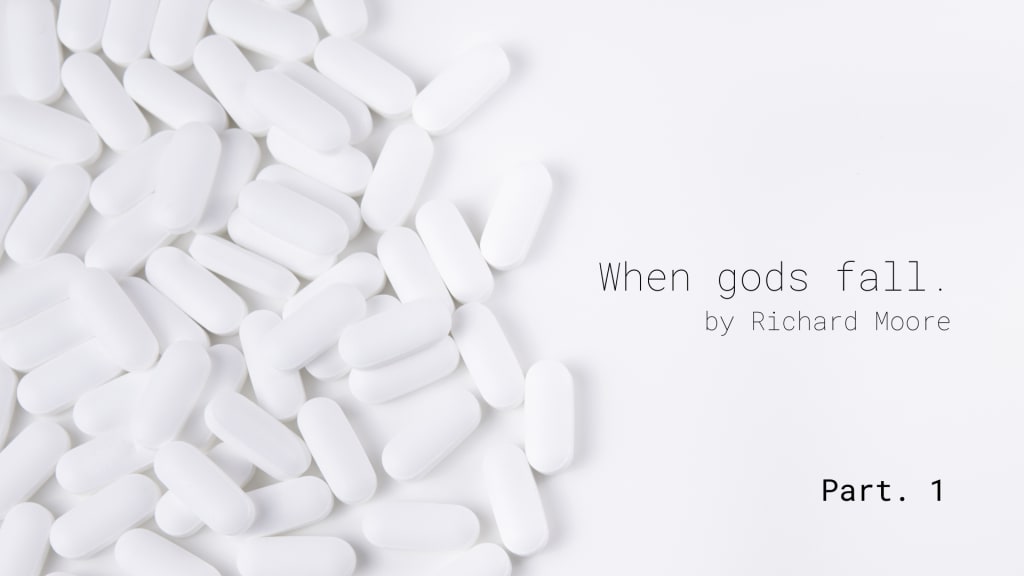When gods fall. (Pt. 1)
A Son's Recount of His Mother's Struggle with Opioids

Her addiction was a slow burn. It was like setting a napkin on fire and adding it to dry pinewood. The flame starts small, then spreads across the logs until it eventually consumes the stack of wood. Small items burn quickly, but the bigger pieces of timber resist the blaze. At first.
By the time the fire takes over, all that will be left is ash.
My mother was the stack; opioids were the fire.
I was barely 12 when she was first exposed to the grip of dependency. For me, nothing changed. My mother was still the strong, hard-headed woman who outworked her peers and kept redefining what it meant to be a successful wife and mother. She was hard on me with my grades, but that was only because she saw my potential. My aunts and uncles all thought she was mad.
“Oh, Tammy. Give that boy a break! It’s only a B,” they would bark.
But it didn’t matter. My mother was the type of person who refused to change her goals, even if the world stood against her. And her main goal was my education.
Those around me had always told me that I favored my mother. It was something about our faces and how our freckles gathered closely on our noses. Raised in the southeast, we were closer than most to the beach but far enough away that it was out of the way. This meant lakes, rivers, woods, and broken sunlight. My skin was pale like hers, and we burnt to a crisp if left in the sunlight unprotected for too long.
I loved her. She was steady, graceful, strong. She fought hard for success later in life and made it, with my father and me cheering in the stands.
It was for these reasons that the drugs were so evil. After all, it hurts worse when gods fall.
The day she was detained by police marked an end to 10 years of struggle. For a decade, I watched my mother slowly die. She wasted away first in her ambitions, giving up pieces of her resilience as the desire for a fix grew stronger. Then, eventually, the grip of the addiction made its way to her mind. A brilliant woman her whole life, it was tough to see her intelligence wane and be replaced with a lack of judgment and social awareness.
It took about eight years for me to notice and nearly nine for everyone else. My father knew much longer.
He was a proud man. Hard worker, great father, and dependable friend. But among his greatest qualities was his loyalty to my mother. Their love was ripped from the fairytales. My father doted on mom like a lost puppy, having found his person. For years, I watched my mother’s needs placed miles ahead of his own. Before the addiction, my mother was incredibly selfless and demanded little sacrifice from our family, but there was still this strong sense of servitude on behalf of my father. At the end of the day, he’d let her do whatever she wanted.
It was a special type of love before the addiction. We all joked with him about it, and most women dreamed of finding such a man. My mother was grateful, and their marriage was strong. But, this fidelity made things challenging towards the pinnacle of my mom’s addiction. His undying devotion was a thick blanket that covered nearly all her misgivings. He built up an impressive repertoire of excuses for her absences, behavior, and increasingly strange habits.
“She’s just really tired,” he’d say. Or “her back is giving her a fit again.” There were roughly 100 other variations of the two. These would stand in place of her notable absences at holidays and birthday parties and strange interactions with friends in public. He did his best to keep my mother's dignity intact while the world inside her was collapsing.
I'll never forget when my parents’ neighbors hosted a yard sale. They were getting rid of some baby furniture for their grandchildren when my cousin and his pregnant wife paid a visit. My mother saw them and met them in the driveway, pointing out a few items she was sure they absolutely needed. The price was more than they were ready to spend, and, frankly, the items weren’t what they were looking for at the time. My cousin graciously declined multiple times, but my mother grew more adamant with each rejection. It finally reached a point where the owner of the house insisted that they didn’t need to buy the items, and my cousin took the opportunity to duck out and leave.
My father was mortified. My cousin’s wife messaged me and told me about the event, and I did my best to intervene by sending my father to go break up the exchange. This was one of the first times our small community noticed something.
But it wouldn’t be the last.
So many different experiences like this occurred until the fateful day the cops were called. It was the day I was accused of assault. The day my mother attempted suicide. The day the family broke down the middle.
The day my mother finally died.
About the Creator
Richard Moore
A professional storyteller.
I make a modest living helping others tell their story. When I'm off the clock, I start writing my own.






Comments
There are no comments for this story
Be the first to respond and start the conversation.